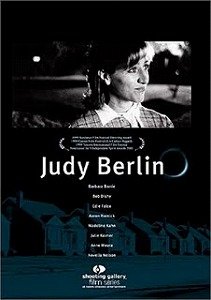"Rebuffing Jewish Angst"

| None | Light | Moderate | Heavy | |
|---|---|---|---|---|
| Language | ||||
| Violence | ||||
| Sex | ||||
| Nudity |
What You Need To Know:
Many viewers will find that JUDY BERLIN sometimes moves at a snail’s pace. The characters of Judy and the son’s mother add humor and life to the movie, however. Although the resolutions of the two main conflicts in JUDY BERLIN are positive, they don’t have a moral point to them. In the final analysis, this is a sweet-natured movie with a mild romantic worldview. Only the gratuitous use of some “f” words and a few strong profanities send the movie into territory best reserved for adult audiences.
Content:
(Ro, LL, V, S, M) Romantic worldview; 11 obscenities (including some “f” words) & 13 profanities; woman slaps other woman; no sex scenes but married man consoles & eventually kisses divorced woman, but abandons further adultery, & teacher clearly has desires for married principal; no nudity; no alcohol use; no smoking; and, despondent man wallows in self-pity.
More Detail:
JUDY BERLIN is a small, critically acclaimed tale of Jewish angst set in the middle class environs of Long Island in New York. The focus of the story is on two Jewish families and their romantic relationships.
In the story, which takes place during a single day, David Gold has come home to his parents’ house. He’s in a despondent mood because his movie career isn’t going as he planned. Not only that, but he’s having trouble communicating his feelings to his parents. Meanwhile, his mother, Alice, and his father, Art, are having communication problems of their own. It doesn’t help matters that Alice seems to be losing her grip on reality.
Edie Falco from TV’s SOPRANOS plays the title character, a young, lively woman of 32. Judy plans to fly to Los Angeles at the end of the day, in order to pursue her acting career. She and David accidentally meet on the street and begin establishing a tentative romance. David seems drawn to her upbeat attitude, but, as a strange eclipse of the sun darkens the whole town for several hours, it looks like David’s doldrums could dampen Judy’s enthusiasm.
It also turns out that Judy’s mother, Sue, who’s an elementary teacher at the local public school, has fallen in love with David’s father, the school principal. Art apparently has similar feelings for Sue, but their passion lies unspoken between them. The movie follows their passionate, unrequited dance at the same time that it shows Art’s daffy housewife coping with her day by enjoying the surprises it has in store for her.
Both Judy and David’s mother, Alice, seem to have escaped the Jewish angst that has overcome the other characters in this movie. They have positive attitudes toward their life. Eventually, Art realizes that he’d rather be with Alice, and David decides that Judy just might succeed after all, despite the obstacles against her.
Many viewers will find that JUDY BERLIN sometimes moves at a snail’s pace. The characters of Judy and Alice add humor and life to the movie, however. The whole cast does a yeoman’s job, but it is worth noting that the late comic actress Madeline Kahn shines in her last role as Alice.
Although the resolutions of the two main conflicts in JUDY BERLIN are positive, they don’t really have a specific moral point to them. In the final analysis, this is a sweet-natured movie with a mild romantic worldview. Only the gratuitous use of some “f” words and a few strong profanities send the movie careening into territory best reserved for adult audiences.



 - Content:
- Content: 



